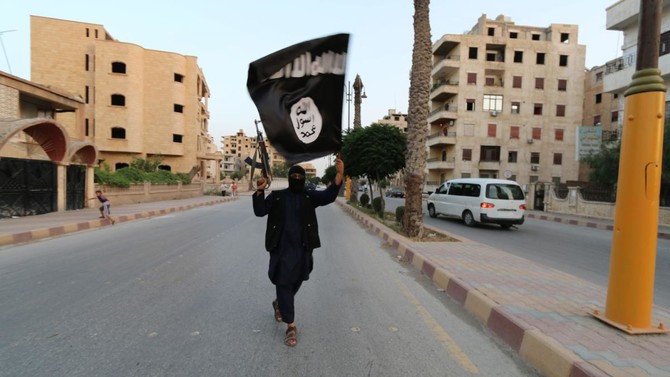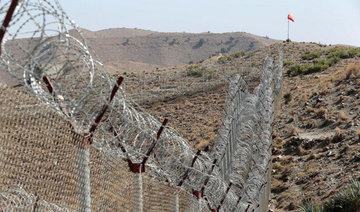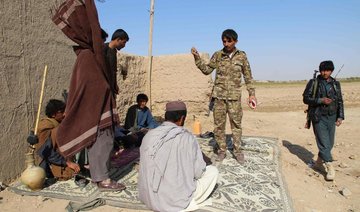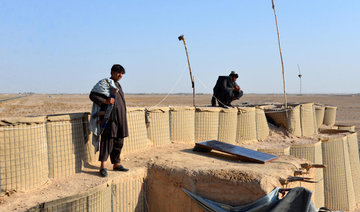JALALABAD, Afghanistan: Daesh on Thursday beheaded 15 of its own fighters due to infighting in Afghanistan’s eastern province of Nangarhar, the local government said.
Further details were not available and there was no confirmation from Daesh, whose local branch is known as Daesh in Khorasan, an old name for the area that includes modern Afghanistan.
Separately, a bomb exploded in Nangarhar’s capital, Jalalabad, the same day, killing at least eight people, although there was no indication of who may have been responsible.
Attaullah Khogyani, the provincial governor’s spokesman, said the 15 Daesh fighters were executed after a bout of infighting in the group, which has become notorious for its brutality. The killings occurred in the Surkh Ab bazaar of Achin district.
Nangarhar, where the movement first appeared around the beginning of 2015, is a volatile hub for Daesh and other militant groups on Afghanistan’s porous border with Pakistan.
The Taliban and Daesh have frequently fought each other in Nangarhar and both have been targeted by sustained US air strikes.
However the exact nature of the relationship between the two groups is little understood. There have been isolated incidents in Afghanistan in which the fighters from the two groups appear to have cooperated.
According to Afghan intelligence documents reviewed by Reuters earlier this year, security officials believe Daesh is present in nine provinces, from Nangarhar and Kunar in the east to Jawzjan, Faryab and Badakhshan in the north and Ghor in the central west.
Daesh beheads 15 of its own fighters in Afghanistan
Daesh beheads 15 of its own fighters in Afghanistan

Syrian girls’ right to schooling unrestricted, new education minister says

Half of Syria’s schools destroyed or damaged, Qadri says
*
Education minister assures girls’ right to education remains unchanged
*
New rulers promise equal treatment for all minority groups
DAMASCUS: Syria will remove all references to the former ruling Baath party from its educational system as of next week but will not otherwise change school curricula or restrict the rights of girls to learn, the country’s new education minister said.
“Education is a red line for the Syrian people, more important than food and water,” Nazir Mohammad Al-Qadri said in an interview from his office in Damascus.
“The right to education is not limited to one specific gender. ... There may be more girls in our schools than boys,” he said.
The secular, pan-Arab nationalist Baath Party governed Syria since a 1963 coup d’etat, seeing education as an important tool for instilling life-long loyalty among the young to the country’s authoritarian ruling system.
President Bashar Assad was toppled on Dec. 8 by Hayat Tahrir Al-Sham (HTS), an Islamist rebel group that some Syrians fear may seek to implement a conservative form of Islamist governance.
But Qadri’s plans reflect their wider management approach and moderate messaging so far.
Syria has long been seen to have one of the Arab world’s strongest education systems, a reputation that has largely survived 13 years of civil war.
Qadri said religion — both Muslim and Christian — will continue to be taught as a subject in school.
Primary schools will remain mixed between boys and girls, while secondary education will stay largely segregated, he said.
“After primary school, there were always schools for females and schools for males. We won’t change that,” said Qadri, who had taken to his ornately-furnished office so recently that he had not yet procured Syria’s new green, white and black flag.
Syria’s new rulers, who have long-since disavowed their former Al-Qaeda links, have said that all of Syria’s minority groups including Kurds, Christians, Druze and Alawites will be treated equal as the new government focuses on rebuilding.
They face a formidable challenge.
Syria remains under tight Western sanctions.
Entire cities were levelled in 13 years of war that Qadri said had also left about half the country’s 18,000 schools damaged or destroyed.
But the rebels have moved into government fast, extending a hand to former state employees who have shown up to work in droves.
Most of the new ministers are young — in their 30s or 40s — making 54-year-old Qadri among the oldest in government.
Born and raised in Damascus, he was imprisoned by the Assad regime in 2008 on what he said were spurious charges of inciting sectarian strife, preventing him from finishing his bachelor’s degree.
He was released a decade later and fled to northern Idlib, then under the control of HTS, becoming education minister in its Salvation Government in 2022.
He is currently finishing his masters thesis in Arabic language.
With the political and social contours of the new Syrian state still being drawn, Qadri said students would not be tested on their mandatory “nationalist studies” — previously a vehicle for teaching Baathism and Assad family history — this year.
Saudi initiative launches pioneering care center for people with disabilities

- Integrated residential care facility is expected to serve over 280 beneficiaries annually
- Project designed to serve as model for development of similar facilities
RIYADH: A Saudi social care project worth SR83 million ($22.1 million) is set to transform support services for people with disabilities in Saudi Arabia’s Qassim Region after a trilateral agreement was signed on Thursday.
The Sakhaa Program, the Abdulaziz Al-Ohali Charitable Foundation, and the Onaizah Association for Development and Human Services, known as Taheel, have joined forces to establish an integrated residential care facility which is expected to serve over 280 beneficiaries annually, the Saudi Press Agency reported.
The initiative aligns with the program’s efforts to support the community through creating sustainable development opportunities and enabling benefactors to actively participate in achieving social and economic development in the Kingdom.
Deputy Secretary-General Nasser bin Mohammed Asiri signed on behalf of the Sakhaa Program, alongside Fahd bin Abdulaziz Al-Ohali, chairman of the Al-Ohali Foundation’s board of trustees, and Musaad bin Yahya Al-Saleem, vice chairman of Taheel Association.
The memorandum of understanding outlines an ambitious project to establish a center that will provide a comprehensive and supportive environment to meet the needs of people with disabilities, according to the SPA.
The facility will offer integrated services, including full residential care supported by specialized rehabilitation programs, comprehensive healthcare covering both therapeutic and preventive aspects, as well as recreational and educational activities to enhance residents’ social and psychological well-being, ensuring their independence and enabling active community participation.
The project’s funding model combines government support, community contributions, and nominal fees to ensure sustainable, high-quality care delivery. Infrastructure development, equipment, and operational costs are included in the total investment.
The project is designed to serve as a model for developing similar centers in the future, the SPA added.
Pakistani ministry signs agreement with National Testing Service for selection of Hajj staff

- Pakistan selects hundreds of assistants via competitive process every year to facilitate local pilgrims
- Pakistan has received 82,000 applications for next year’s Hajj pilgrimage under government scheme
ISLAMABAD: The Pakistani ministry of religious affairs has signed an agreement with the National Testing Service, which will hold exams for the selection of supervisors and assistants for next year’s Hajj pilgrimage, the ministry said on Thursday.
Pakistan selects hundreds of assistants and doctors from federal and provincial government departments via a competitive process every year to facilitate local pilgrims in performing the rituals of the annual pilgrimage in Saudi Arabia.
Pakistan had received 82,000 applications for next year’s Hajj under the government scheme by Tuesday when the submission deadline ended. Saudi Arabia has allotted Pakistan a quota of 179,210 pilgrims, to be divided equally between government and private schemes. The government extended the deadline for applications twice this month, first from Dec. 3 to Dec. 10, and then to Dec. 17, as it aims to fill over 89,000 seats under the federal government quota.
“Like last year, this year too, the selection of Hajj Assistants who will be sent on Hajj duty will be done through National Testing Service,” the religious affairs ministry said.
“According to the agreement, staff will be appointed on the basis of merit as per the federal and provincial quotas, in which a specific ratio of new and experienced assistants has been kept … Government employees and officers of Scale 7 to 18 will be eligible to apply.”
The ministry said it would “soon” announce the selection through an advertisement.
The ministry of religious affairs trains Hajj assistants and pilgrims every year ahead of their departure to Saudi Arabia to ensure all aspects of the pilgrimage process, including food, transportation, and accommodation in Makkah and Madinah, run smoothly.
Pakistan last year sent 550 Hajj assistants and 400 doctors and paramedical staff to Saudi Arabia to facilitate pilgrims.
AI cannot replace human creativity in literature, expert says

- Dr. Anas Al-Ghamdi: Certain fields will benefit by using AI, but it cannot create great literature
- Al-Ghamdi: When you read a text translated by a machine, you feel the translator’s feelings, not the writer’s
JEDDAH: Artificial intelligence cannot replace the creativity of human beings in literature, according to an expert attending the Jeddah Book Fair 2024.
Dr. Anas Al-Ghamdi, an academic, researcher and author specializing in AI, made the statement in a discussion during a symposium titled: “Artificial Intelligence and the Future of the Book.”
The session was moderated by Mohammed Basalama, an entrepreneur in the cultural sector, who opened the symposium by raising a few questions about the impact of artificial intelligence in the book sector, asking: Will AI be a partner that enhances creativity or a competitor that threatens the human values of literary texts?
He mentioned the main themes of the symposium, which included: the role of AI in improving writing and publishing, its impact on literary creativity and the human value of books, as well as the ethical and legal challenges related to the ownership of produced texts, in addition to using AI as a tool to enhance innovation rather than compete with it.
Al-Ghamdi replied by saying that no doubt AI has become an integral part of life and it can provide a huge amount of information to people in no time, but it cannot create special feelings and the free flow of imagination as human authors do in their writings.
“If we do not use it, others will. Of course, certain fields will benefit by using AI, but it cannot create great literature,” he said.
Al-Ghamdi said that there is a role for AI in enhancing the work of publishing houses by improving marketing, production, and sales.
But, he said, machine translation still suffers from emotional gaps, saying: “When you read a text translated by a machine, you feel the translator’s feelings, not the writer’s.”
The symposium explored how modern technology can reshape the writing and publishing experience, emphasizing the need to use AI as a tool to support human creativity.
It also discussed the ethical and professional challenges related to the ownership of texts produced by AI, while presenting innovative visions for employing this technology to achieve a sustainable future that combines human creativity and technological innovation.
Al-Ghamdi affirmed that AI is not a substitute for human creativity, but a tool that can enrich this creativity if used properly.
Pakistani president calls for greater parliamentary cooperation with Saudi Arabia

- Chairman of Saudi Arabia’s Shura Council is on three-day visit to Pakistan
- Council is legislative body that advises the king and his regulatory authority
ISLAMABAD: President Asif Ali Zardari on Thursday met Dr. Abdullah bin Mohammed bin Ibrahim Al-Sheikh, the chairman of Saudi Arabia’s Shura Council, and discussed enhancing parliamentary cooperation and high-level exchanges with the Kingdom.
The chairman of the Shura Council, a legislative body that advises the king and his regulatory authority, is on a three-day visit to Pakistan, during which he has met Prime Minister Shehbaz Sharif, Senate Chairman Yousaf Raza Gillani, National Assembly Speaker Ayaz Sadiq and others.
“President Zardari has emphasized the need for enhancing parliamentary cooperation and high-level exchanges with the Kingdom of Saudi Arabia (KSA) to deepen the fraternal relationship between Pakistan and KSA,” the president’s office said in a press release on Thursday after he met the visiting dignitary.
“He reaffirmed Pakistan’s commitment to further strengthening economic, political, and cultural ties with KSA for the mutual benefit of both nations … both sides emphasized the need to transform the longstanding bilateral relationship into a more robust and strategic partnership.”
Zardari also expressed concern over the conflict in the Middle East, saying Pakistan stood in solidarity with “brothers and sisters” from Palestine, Lebanon and Syria.
Pakistan and Saudi Arabia are longtime allies, with Islamabad seeking closer economic, defense and security ties with the Kingdom, host to nearly 2.5 million Pakistani expatriates and the largest source of remittances for the cash-strapped South Asian nation.
















